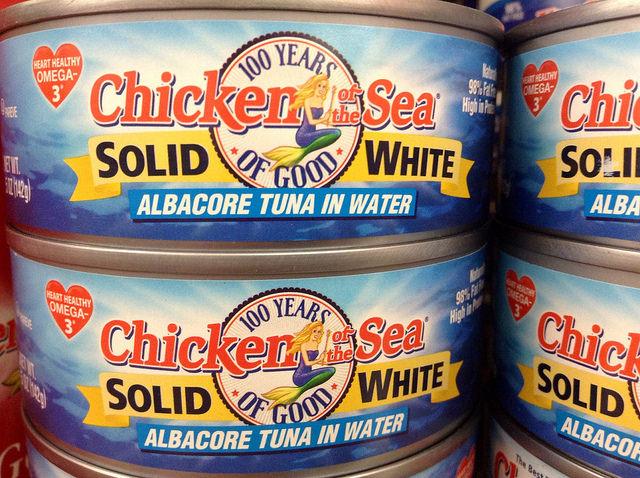
Chicken of the Sea is a popular canned tuna brand, and Americans just adore its tuna. But there are big problems associated with that little can of tuna, as a recent Greenpeace campaign highlights.
Greenpeace just launched a global campaign against Thai Union Group (TUG), the world’s largest canned company, which owns Chicken of the Sea. Greenpeace is calling on the company to eliminate labor abuse and fishing practices that cause environmental damage from its supply chains.
Earlier this year, investigations by the New York Times and Associated Press revealed that TUG is connected to environmentally destructive fishing methods, human rights abuses and even forced labor. In the AP’s year-long investigation, Burmese men were interviewed who were taken through Thailand to Indonesia and forced to fish. The fish they caught was shipped to Thailand and sold globally, ending up in grocery stores “such as Kroger, Albertsons and Safeway,” according to the AP.
The New York Times investigation found that labor abuse at sea “can be so severe that the boys and men who are its victims might as well be captives from a bygone era.” In interviews, men who survived forced fishing labor reported horrendous abuses such as “the sick cast overboard, the defiant beheaded, the insubordinate sealed for days below deck in a dark, fetid fishing hold.”
“We can no longer allow Thai Union Group and its brands around the world, including Chicken of the Sea, to sacrifice the world’s oceans and jeopardize workers at sea,” said Greenpeace USA seafood markets lead, Graham Forbes.“Chicken of the Sea is one of the worst US canned tuna brands on both sustainability and human rights,” Greenpeace USA oceans campaigner, Kate Melges, added. “As the largest brand owned by the largest canned tuna company in the world, Thai Union Group, it’s critical that Chicken of the Sea step up as a leader to ensure its products meet the standards it claims to support. That means working urgently to change to lower-impact fishing methods and guarantee oversight and traceability at sea.”
Last Friday, Greenpeace USA contacted TUG and demanded the company create a work plan and schedule to improve fishing practices and increase oversight and transparency. The environmental group also sent an investor brief to TUG shareholders, which outlined the risks to TUG’s operations, which include:
- The fishing methods used by TUG and its suppliers have serious environmental impacts and reputational risks.
- Forced labor and human rights abuses taint the company’s seafood supply chain and lead to social impacts and reputational risks.
Clearly, it is time for TUG to fix the problems uncovered in its supply chain. Environmental damage and human rights abuses should not be associated with a little can of tuna. As a 2014 report by Fishwise put it, "The time has come for companies to take responsibility for both environmental sustainability and social aspects of their seafood supply chains." By doing so, companies not only improve their public image but make their supply chains more sustainable.
Image credit: Flickr/Mike Mozart

Gina-Marie is a freelance writer and journalist armed with a degree in journalism, and a passion for social justice, including the environment and sustainability. She writes for various websites, and has made the 75+ Environmentalists to Follow list by Mashable.com.














